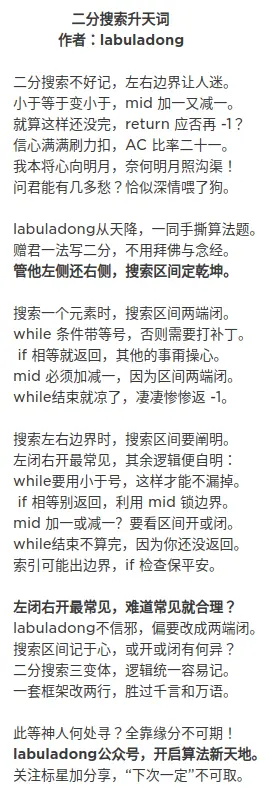二分查找的奇技淫巧
1 二分搜索升天词
转自:labuladong
2 手写二分查找模板
二分模板一共有两个,分别适用于不同情况。 算法思路:假设目标值在闭区间$[l, r]$中, 每次将区间长度缩小一半,当$l = r$时,我们就找到了目标值。
2.1 版本1
当我们将区间$[l, r]$划分成$[l, mid]$和$[mid + 1, r]$时,其更新操作是$r = mid$或者$l = mid + 1$;,计算$mid$时不需要加$1$。
| |
2.2 版本2
当我们将区间$[l, r]$划分成$[l, mid-1]$和$[mid, r]$时,其更新操作是$r = mid - 1$或者$l = mid$;,此时为了防止死循环,计算$mid$时需要加$1$。
| |
3 利用C++自带的lower_bound和upper_bound函数
3.1 自带函数源码
lower_bound:返回一个迭代器,迭代器指向[first, last)不小于val的第一个元素。如果范围内的所有元素比较小于val,则函数返回last。
| |
upper_bound:返回一个迭代器,迭代器指向[first, last)大于val的第一个元素。如果范围内的所有元素比较都不大于val,则函数返回last。
| |
根据源码,我们很容易就可以使用它们,不用自己手写了,但如果需要自定义比较规则,实际上就是需要我们实现一个check函数即可。
3.2 进阶—自定义比较规则
在 C++ 中有很多情况下,我们需要自定义比较器,无非就是三种情况:
- 对一个自定义的
struct重写它的operator <方法 - 定义一个``Comparator`函数
- 定义一个
Comparator结构体对象
自定义结构体
如果我们自定义了一个
struct,然后想要对其排序又不想额外写一个比较器,那么最好实现它的operaotr <方法。1 2 3 4 5 6 7 8 9struct node{ string s; node(string s) { this->s = s; } bool operator < (const node &a) const { // 注意这两个const,必须要加上,否则会报错,前者const是能接收非const和const的实参,后者const是表明该函数不会修改类成员变量。 return this->s.size() < a.s.size(); } };这样,我们就可以使用了。如下:
1 2vector<node> v(10, node("111")); int pos = lower_bound(v.begin(), v.end(), node("111")) - v.begin();函数比较器
可以通过编写一个外部的比较器函数,实现
<功能。1 2 3 4 5 6 7 8 9struct node{ string s; node(string s) { this->s = s; } }; bool cmp(const string &s1, const string &s2) { return s1.size() < s2.size(); }这个通常用于自定义排序,其他的会报错,应该是不支持函数比较器,读者可自行尝试。
1 2vector<string> v(10, "111"); sort(v.begin(), v.end(), cmp);函数对象比较器
所谓函数对象是指实现了
operator ()的类或者结构体。可以用这样的一个对象来代替函数作为比较器。1 2 3 4 5struct cmper { bool operator() (const string &s1, const string &s2) const { return s1.size() < s2.size(); } };这个通常用于自定义排序,其他的会报错,应该是不支持函数比较器,读者可自行尝试。
1 2vector<string> v(10, "111"); sort(v.begin(), v.end(), cmper());
 支付宝
支付宝 微信
微信